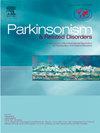以色列帕金森病的基因检测:来自罗斯托克帕金森病(ROPAD)研究的见解
IF 3.1
3区 医学
Q2 CLINICAL NEUROLOGY
引用次数: 0
摘要
研究人员对以色列帕金森病(PD)患者进行了大规模基因检测,发现GBA1的危险因素变异和/或LRRK2的致病性p.Gly2019Ser变异在德系犹太人人群中普遍存在。方法本研究纳入了参与罗斯托克帕金森病(ROPAD)研究的所有以色列运动障碍诊所的数据。对患者进行了8个pd相关基因和37个可能存在表型重叠的基因的变异检测。结果共纳入3期PD患者2699例,其中男性1702例(63.1%),平均发病年龄59.2±10.6岁,有PD家族史的718例(26.6%)。pd相关基因检测(PDGT)阳性512例(19.0%)。187例(6.9%)患者的结果是由于LRRK2的致病变异,283例(10.5%)患者的结果是由于GBA1的危险因素变异,另外15例(0.6%)患者是两个基因变异的携带者。26名受试者(1.0%)基于PRKN (n = 19)、PINK1 (n = 4)、PARK7、SNCA或VPS35(每个基因一个)的发现有PDGT阳性,另外一名患者有双重发现(GBA1和SNCA)。最常见的变异是LRRK2 p.Gly2019Ser和GBA1 p.Asn409Ser,分别在191例(7.1%)和173例(6.4%)患者中检测到。排除仅携带LRRK2和/或GBA1变异的患者,产率为27/2214(1.2%)。7名参与者,包括1名PDGT阳性的参与者,在肌张力障碍(GCH1和TOR1A)和痴呆(MAPT)相关基因的检测结果呈阳性。结论对以色列PD患者进行基因检测是有益的,而产量主要归因于LRRK2和GBA1变异。本文章由计算机程序翻译,如有差异,请以英文原文为准。
Genetic testing for Parkinson's disease in Israel: Insights from the Rostock Parkinson's Disease (ROPAD) study
Background
We examined the yield of a large-scale genetic testing for patients with Parkinson's disease (PD) in Israel, where risk factor variants in GBA1 and/or the pathogenic p.Gly2019Ser variant in LRRK2 are prevalent among the Ashkenazi Jewish population.
Methods
This study included data from all Israeli movement disorder clinics participating in the Rostock Parkinson's Disease (ROPAD) study. Patients were tested for variants in eight PD-related genes and 37 genes with possible phenotypic overlap.
Results
The sample consisted of 2699 PD patients recruited in three phases (1702 [63.1 %] males, mean age at onset 59.2 ± 10.6 years, 718 [26.6 %] with a family history of PD). Positive PD-relevant genetic test (PDGT) results were obtained in 512 participants (19.0 %). Among 187 (6.9 %) patients the results were due to pathogenic variants only in LRRK2, in 283 (10.5 %) due to risk factor variants only in GBA1, and another 15 patients (0.6 %) were carriers of variants in both genes. Twenty-six subjects (1.0 %) had a positive PDGT based on findings in PRKN (n = 19), PINK1 (n = 4), PARK7, SNCA, or VPS35 (one in each gene), and an additional patient had dual findings (GBA1 and SNCA). The most prevalent variants were LRRK2 p.Gly2019Ser and GBA1 p.Asn409Ser, detected in 191 (7.1 %) and 173 (6.4 %) patients, respectively. Excluding patients harboring only LRRK2 and/or GBA1 variants, the yield was 27/2214 (1.2 %). Seven participants, including one with a positive PDGT, had positive testing findings in genes related to dystonia (GCH1 and TOR1A) and dementia (MAPT).
Conclusions
Genetic testing for Israeli PD patients is beneficial, while the yield is primarily attributed to LRRK2 and GBA1 variants.
求助全文
通过发布文献求助,成功后即可免费获取论文全文。
去求助
来源期刊

Parkinsonism & related disorders
医学-临床神经学
CiteScore
6.20
自引率
4.90%
发文量
292
审稿时长
39 days
期刊介绍:
Parkinsonism & Related Disorders publishes the results of basic and clinical research contributing to the understanding, diagnosis and treatment of all neurodegenerative syndromes in which Parkinsonism, Essential Tremor or related movement disorders may be a feature. Regular features will include: Review Articles, Point of View articles, Full-length Articles, Short Communications, Case Reports and Letter to the Editor.
 求助内容:
求助内容: 应助结果提醒方式:
应助结果提醒方式:


